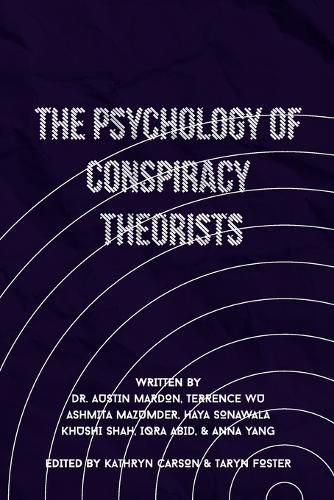Readings Newsletter
Become a Readings Member to make your shopping experience even easier.
Sign in or sign up for free!
You’re not far away from qualifying for FREE standard shipping within Australia
You’ve qualified for FREE standard shipping within Australia
The cart is loading…






This title is printed to order. This book may have been self-published. If so, we cannot guarantee the quality of the content. In the main most books will have gone through the editing process however some may not. We therefore suggest that you be aware of this before ordering this book. If in doubt check either the author or publisher’s details as we are unable to accept any returns unless they are faulty. Please contact us if you have any questions.
The term "conspiracy theory" is becoming alarmingly prevalent in our current media landscape. But what does that actually mean? What are conspiracy theories and how do they burrow their way into our society and influence so many people, potentially even changing their fundamental beliefs and world views? These are the questions The Psychology of Conspiracy Theorists seeks to explore. In order to situate our reader, this discussion begins with the impact of conspiracy theories in our modern world and an in-depth breakdown of the definition and categorization of conspiracy theories. The following chapters will discuss the sweeping consequences of misinformation and two potential reasons why people believe in these theories despite the lack of scientific evidence to support them, specifically the existential and social motives behind their beliefs. This examination would be incomplete without exploring the origins and impacts of specific theories throughout recent history, including those surrounding the moon landing, 9/11, and even the now infamous virus COVID-19. The Psychology of Conspiracy Theorists strives to educate the general reader on the origins and the wide-reaching impacts of conspiracy theories as well as the psychology behind why people believe the unbelievable.
$9.00 standard shipping within Australia
FREE standard shipping within Australia for orders over $100.00
Express & International shipping calculated at checkout
This title is printed to order. This book may have been self-published. If so, we cannot guarantee the quality of the content. In the main most books will have gone through the editing process however some may not. We therefore suggest that you be aware of this before ordering this book. If in doubt check either the author or publisher’s details as we are unable to accept any returns unless they are faulty. Please contact us if you have any questions.
The term "conspiracy theory" is becoming alarmingly prevalent in our current media landscape. But what does that actually mean? What are conspiracy theories and how do they burrow their way into our society and influence so many people, potentially even changing their fundamental beliefs and world views? These are the questions The Psychology of Conspiracy Theorists seeks to explore. In order to situate our reader, this discussion begins with the impact of conspiracy theories in our modern world and an in-depth breakdown of the definition and categorization of conspiracy theories. The following chapters will discuss the sweeping consequences of misinformation and two potential reasons why people believe in these theories despite the lack of scientific evidence to support them, specifically the existential and social motives behind their beliefs. This examination would be incomplete without exploring the origins and impacts of specific theories throughout recent history, including those surrounding the moon landing, 9/11, and even the now infamous virus COVID-19. The Psychology of Conspiracy Theorists strives to educate the general reader on the origins and the wide-reaching impacts of conspiracy theories as well as the psychology behind why people believe the unbelievable.